James Whitcomb Riley Poems
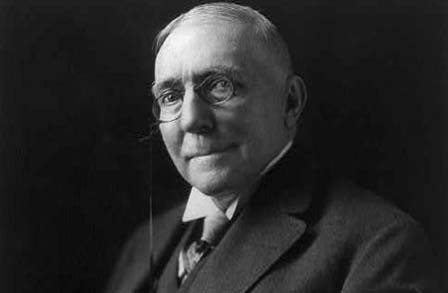
| James Whitcomb Riley October 7, 1849 - July 22, 1916 American writer, poet, and best-selling author |
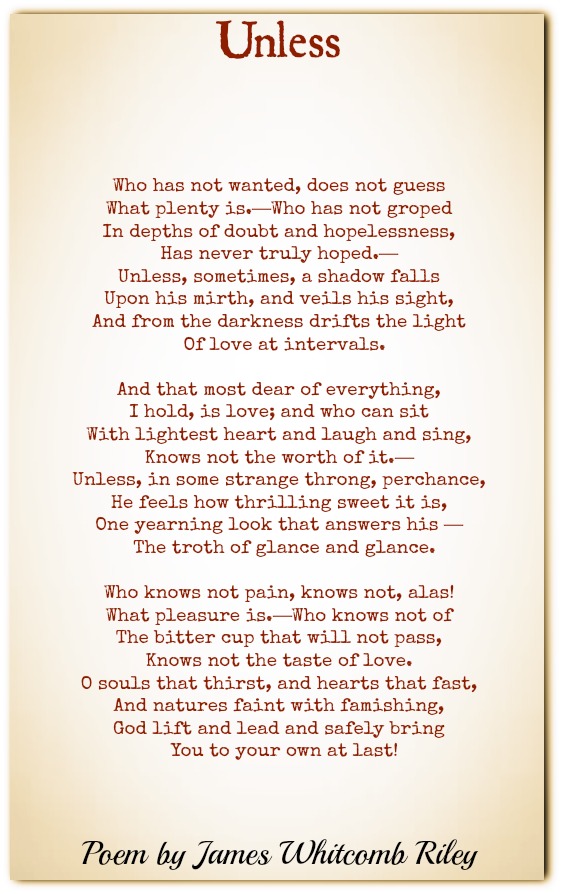 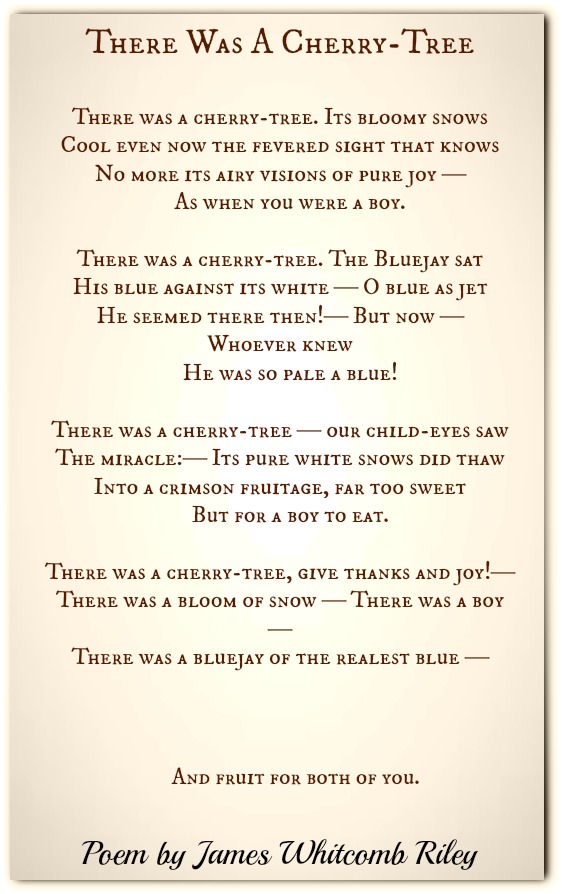 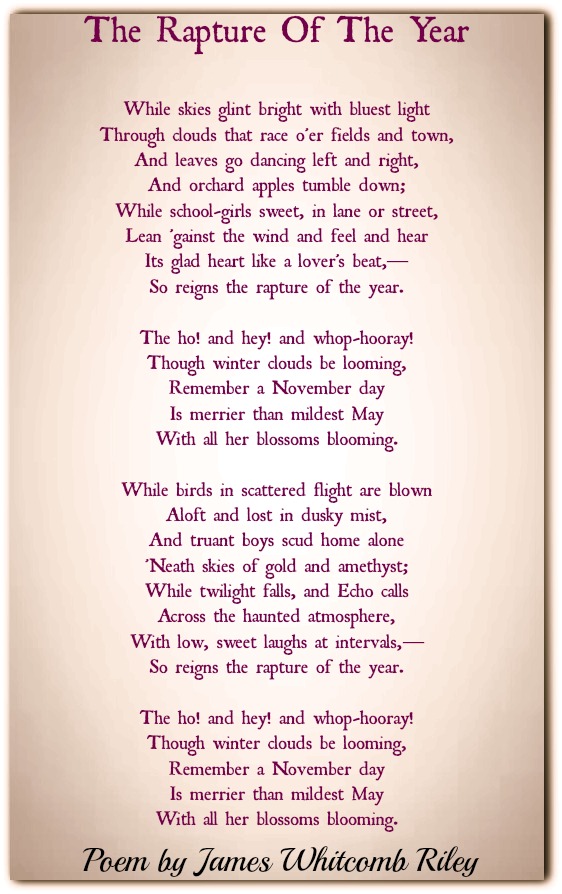 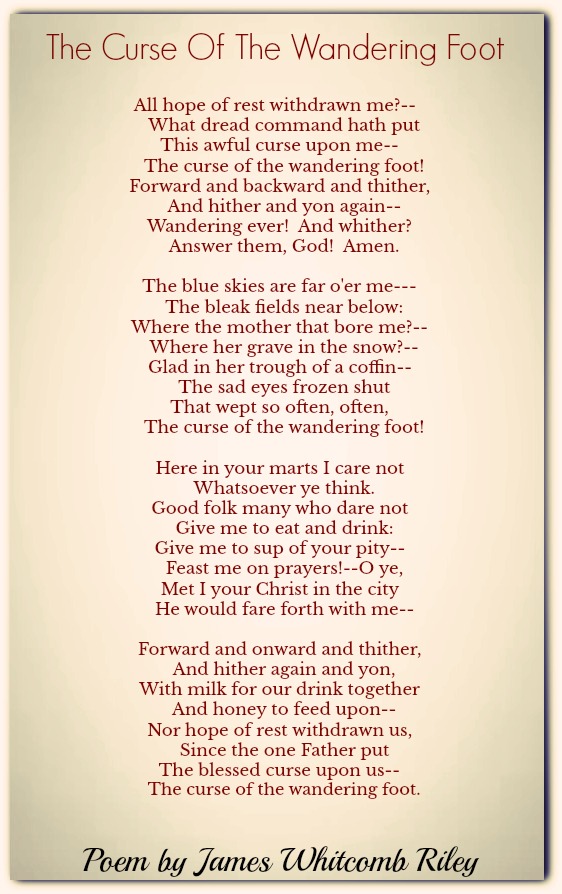 The Lost Thrill I grow so weary, someway, of all things That love and loving have vouchsafed to me, Since now all dreamed-of sweets of ecstasy Am I possessed of: The caress that clings— The lips that mix with mine with murmurings No language may interpret, and the free, Unfettered brood of kisses, hungrily Feasting in swarms on honeyed blossomings Of passion's fullest flower—For yet I miss The essence that alone makes love divine— The subtle flavoring no tang of this Weak wine of melody may here define:— A something found and lost in the first kiss A lover ever poured through lips of mine. The Best is Good Enough I quarrel not with destiny, But make the best of everything— The best is good enough for me. Leave discontent alone, and she Will shut her mouth and let you sing. I quarrel not with destiny. I take some things, or let 'em be— Good gold has always got the ring; The best is good enough for me. Since fate insists on secrecy, I have no arguments to bring— I quarrel not with destiny. The fellow that goes "haw" for "gee" Will find he hasn't got full swing. The best is good enough for me. One only knows our needs, and he Does all of the distributing. I quarrel not with destiny: The best is good enough for me. Moon-Drowned 'Twas the height of the fete when we quitted the riot, And quietly stole to the terrace alone, Where, pale as the lovers that ever swear by it, The moon it We stood there enchanted.--And O the delight of The sight of the stars and the moon and the sea, And the infinite skies of that opulent night of Purple and gold and ivory! The lisp of the lip of the ripple just under-- The half-awake nightingale's dream in the yews-- Came up from the water, and down from the wonder Of shadowy foliage, drowsed with the dews,-- Unsteady the firefly's taper--unsteady The poise of the stars, and their light in the tide, As it struggled and writhed in caress of the eddy, As love in the billowy breast of a bride. The far-away lilt of the waltz rippled to us, And through us the exquisite thrill of the air: Like the scent of bruised bloom was her breath, and its dew was Not honier-sweet than her warm kisses were. We stood there enchanted.--And O the delight of The sight of the stars and the moon and the sea, And the infinite skies of that opulent night of Purple and gold and ivory! A Song There is ever a song somewhere, my dear; There is ever a something sings alway: There's the song of the lark when the skies are clear, And the song of the thrush when the skies are gray. The sunshine showers across the grain, And the bluebird trills in the orchard tree; And in and out, when the eaves dip rain, The swallows are twittering ceaselessly. There is ever a song somewhere, my dear, Be the skies above or dark or fair, There is ever a song that our hearts may hear-- There is ever a song somewhere, my dear There is ever a song somewhere! There is ever a song somewhere, my dear, In the midnight black, or the mid-day blue: The robin pipes when the sun is here, And the cricket chirrups the whole night through. The buds may blow, and the fruit may grow, And the autumn leaves drop crisp and sear; But whether the sun, or the rain, or the snow, There is ever a song somewhere, my dear. There is ever a song somewhere, my dear, Be the skies above or dark or fair, There is ever a song that our hearts may hear-- There is ever a song somewhere, my dear-- There is ever a song somewhere The Mulberry Tree It's many's the scenes which is dear to my mind As I think of my childhood so long left behind; The home of my birth, with it's old puncheon-floor, And the bright morning-glories that growed round the door; The warped clab-board roof whare the rain it run off Into streams of sweet dreams as I laid in the loft, Countin' all of the joys that was dearest to me, And a-thinkin' the most of the mulberry tree. And to-day as I dream, with both eyes wide-awake, I can see the old tree, and its limbs as they shake, And the long purple berries that rained on the ground Whare the pastur' was bald whare we trommpt it around. And again, peekin' up through the thick leafy shade, I can see the glad smiles of the friends when I strayed With my little bare feet from my own mother's knee To foller them off to the mulberry tree. Leanin' up in the forks, I can see the old rail, And the boy climbin' up it, claw, tooth, and toe-nail, And in fancy can hear, as he spits on his hands, The ring of his laugh and the rip of his pants. But that rail led to glory, as certin and shore As I'll never climb thare by that rout' any more-- What was all the green lauruls of Fame unto me, With my brows in the boughs of the mulberry tree! Then it's who can fergit the old mulberry tree That he knowed in the days when his thoughts was as free As the flutterin' wings of the birds that flew out Of the tall wavin' tops as the boys come about? O, a crowd of my memories, laughin' and gay, Is a-climbin' the fence of that pastur' to-day, And, a-pantin' with joy, as us boys ust to be, They go racin' acrost fer the mulberry tree. Back From A Two-years' Sentence Back from a two-years' sentence! And though it had been ten, You think, I were scarred no deeper In the eyes of my fellow-men. "My fellow-men--?" Sounds like a satire, You think-- and I so allow, Here in my home since childhood, Yet more than a stranger now! Pardon--! Not wholly a stranger--, For I have a wife and child: That woman has wept for two long years, And yet last night she smiled--! Smiled, as I leapt from the platform Of the midnight train, and then-- All that I knew was that smile of hers, And our babe in my arms again! Back from a two-years' sentence-- But I've thought the whole thing through--, A hint of it came when the bars swung back And I looked straight up in the blue Of the blessed skies with my hat off! O-ho! I've a wife and child: That woman has wept for two long years, And yet last night she smiled! When Mother Combed My Hair When Memory, with gentle hand, Has led me to that foreign land Of childhood days, I long to be Again the boy on bended knee, With head a-bow, and drowsy smile Hid in a mother's lap the while, With tender touch and kindly care, She bends above and combs my hair. Ere threats of Time, or ghosts of cares Had paled it to the hue it wears, Its tangled threads of amber light Fell o'er a forehead, fair and white, That only knew the light caress Of loving hands, or sudden press Of kisses that were sifted there The times when mother combed my hair. But its last gleams of gold have slipped Away; and Sorrow's manuscript Is fashioned of the snowy brow-- So lined and underscored now That you, to see it, scarce would guess It e'er had felt the fond caress Of loving lips, or known the care Of those dear hands that combed my hair. I am so tired! Let me be A moment at my mother's knee; One moment--that I may forget The trials waiting for me yet: One moment free from every pain-- O! Mother! Comb my hair again! And I will, oh, so humbly bow, For I've a wife that combs it now. The Pathos Of Applause The greeting of the company throughout Was like a jubilee,--the children's shout And fusillading hand-claps, with great guns And detonations of the older ones, Raged to such tumult of tempestuous joy, It even more alarmed than pleased the boy; Till, with a sudden twitching lip, he slid Down to the floor and dodged across and hid His face against his mother as she raised Him to the shelter of her heart, and praised His story in low whisperings, and smoothed The "amber-colored hair," and kissed, and soothed And lulled him back to sweet tranquillity-- "And 'ats a sign 'at you're the Ma fer me!" He lisped, with gurgling ecstasy, and drew Her closer, with shut eyes; and feeling, too, If he could only _purr_ now like a cat, He would undoubtedly be doing that! "And now"--the serious host said, lifting there A hand entreating silence;--"now, aware Of the good promise of our Traveler guest To add some story with and for the rest, I think I favor you, and him as well, Asking a story I have heard him tell, And know its truth,in each minute detail:" Then leaning on his guest's chair, with a hale Hand-pat by way of full indorsement, he Said, "Yes--the Free-Slave story--certainly." The old man, with his waddy notebook out, And glittering spectacles, glanced round about The expectant circle, and still firmer drew His hat on, with a nervous cough or two: And, save at times the big hard words, and tone Of gathering passion--all the speaker's own,-- The tale that set each childish heart astir Was thus told by "The Noted Traveler." Say Something To Me Say something to me! I've waited so long-- Waited and wondered in vain; Only a sentence would fall like a song Over this listening pain-- Over a silence that glowers and frowns,-- Even my pencil to-night Slips in the dews of my sorrow and wounds Each tender word that I write. Say something to me--if only to tell Me you remember the past; Let the sweet words, like the notes of a bell, Ring out my vigil at last. O it were better, far better than this Doubt and distrust in the breast,-- For in the wine of a fanciful kiss I could taste Heaven, and--rest. Say something to me! I kneel and I plead, In my wild need, for a word; If my poor heart from this silence were freed, I could soar up like a bird In the glad morning, and twitter and sing, Carol and warble and cry Blithe as the lark as he cruises awing Over the deeps of the sky. The Old Guitar Neglected now is the old guitar And moldering into decay; Fretted with many a rift and scar That the dull dust hides away, While the spider spins a silver star In its silent lips to-day. The keys hold only nerveless strings— The sinews of brave old airs Are pulseless now; and the scarf that clings So closely here declares A sad regret in its ravelings And the faded hue it wears. But the old guitar, with a lenient grace, Has cherished a smile for me; And its features hint of a fairer face That comes with a memory Of a flower-and-perfume-haunted place And a moonlit balcony. Music sweeter than words confess, Or the minstrel's powers invent, Thrilled here once at the light caress Of the fairy hands that lent This excuse for the kiss I press On the dear old instrument. The rose of pearl with the jeweled stem Still blooms; and the tiny sets In the circle all are here; the gem In the keys, and the silver frets; But the dainty fingers that danced o'er them— Alas for the heart's regrets!— Alas for the loosened strings to-day, And the wounds of rift and scar On a worn old heart, with its roundelay Enthralled with a stronger bar That Fate weaves on, through a dull decay Like that of the old guitar! The Serenade The midnight is not more bewildering To her drowsed eyes, than to her ears, the sound Of dim, sweet singing voices, interwound With purl of flute and subtle twang of string, Strained through the lattice, where the roses cling And, with their fragrance, waft the notes around Her haunted senses. Thirsting beyond bound Of her slow-yielding dreams, the lilt and swing Of the mysterious delirious tune, She drains like some strange opiate, with awed eyes Upraised against her casement, where aswoon, The stars fail from her sight, and up the skies Of alien azure rolls the full round moon Like some vast bubble blown of summer noon. Longfellow The winds have talked with him confidingly; The trees have whispered to him; and the night Hath held him gently as a mother might, And taught him all sad tones of melody: The mountains have bowed to him; and the sea, In clamorous waves, and murmurs exquisite, Hath told him all her sorrow and delight-- Her legends fair-- her darkest mystery. His verse blooms like a flower, night and day; Bees cluster round his rhymes; and twitterings Of lark and swallow, in an endless May, Are mingling with the tender songs he sings--. Nor shall he cease to sing-- in every lay Of Nature's voice he sings-- and will alway. A Rough Sketch I caught, for a second, across the crowd-- Just for a second, and barely that-- A face, pox-pitted and evil-browed, Hid in the shade of a slouch-rim'd hat-- With small gray eyes, of a look as keen As the long, sharp nose that grew between. And I said: 'Tis a sketch of Nature's own, Drawn i' the dark o' the moon, I swear, On a tatter of Fate that the winds have blown Hither and thither and everywhere-- With its keen little sinister eyes of gray, And nose like the beak of a bird of prey! |
Return To Famous Poems
James Whitcomb Riley Poems
